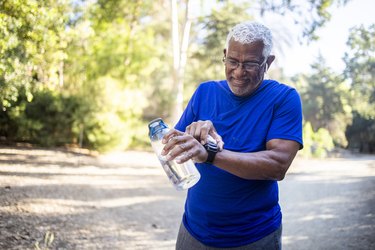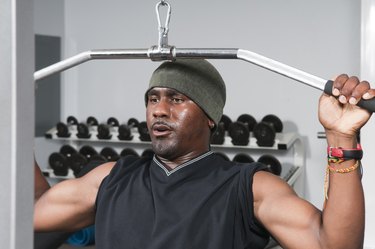
Your bones do amazing things and work hard for you every day. They allow you to move, they protect your brain and vital organs and they store necessary minerals.
But as you age, your bone density can diminish — causing weak, brittle bones — which can lead to injury.
Video of the Day
Video of the Day
Fortunately, you can preserve and even improve the health of your bones by adding a few things to your morning routine.
"I have seen the importance of bone health firsthand," says Christopher Sforzo, MD, a board-certified orthopedic surgeon based in Sarasota, Florida. "It's never too early or too late to start taking care of your bones."
Here are seven things you can do each morning to start your day off right, according to bone health professionals.
1. Start Your Day With a Glass of Water
Whether you like it cold or room temperature, drinking a glass of water first thing in the morning is an important part of not just your overall health, but your bone health, too.
Turns out, your bones are partially made up of water, and they need water to do specific jobs, like storing minerals and making red blood cells inside the bone marrow, per the United States Geological Survey. In fact, without proper hydration, you could end up with bone loss or osteoporosis, per a June 2022 review in Bone Reports.
What's more, water transports 99 percent of the calcium in foods you eat to your bones, per the National Library of Medicine (NLM), so good hydration equals stronger bones.
Aim to start your day with a glass of water, and remember to drink even more throughout the day. You should get about 11.5 to 15.5 cups of water per day, through drinking or water-rich foods, per the Mayo Clinic.
2. Eat a Calcium-Rich Breakfast
Calcium is one of the most important nutrients for bone health — it's the mineral that makes bones hard and strong, and it helps bones repair, per the Cleveland Clinic. And, nearly all of your body's calcium is stored in your bones, according to the Harvard T.H. Chan School of Public Health.
This is why getting calcium every day is important, ideally through eating calcium-rich foods or by taking a calcium supplement if necessary.
You can find calcium in dairy products like milk, cheese and yogurt. Other sources of calcium include fortified orange juice, leafy greens, almonds and fatty fish like salmon.
For a calcium-rich breakfast, then, go for cereal with milk and a glass of orange juice, yogurt topped with almonds and fruit or toast with lox and cream cheese.
Tip
Many dairy products are typically fortified with vitamin D, which is an essential nutrient your body needs in order to absorb calcium.
3. Do Some Bone-Strengthening Exercises
We all know exercise is good for more than just your bones, but specific exercises will actually strengthen your bones and stimulate growth.
In particular, weight-bearing exercise and weightlifting can help strengthen your bones, help you maintain bone density and lower your risk for osteoporosis, per the National Institutes of Health (NIH). This can include walking, running, playing tennis, dancing or any exercise where you're on your feet, as well as using free weights, weight machines or doing bodyweight exercises.
"The key for all ages and conditions is to get some weight-bearing exercise, which also signals your endocrine system to secrete appropriate enzymes that can ensure proper bone health," says Mark Slabaugh, MD, a board-certified orthopedic surgeon in Baltimore, Maryland.
Tip
The Physical Activity Guidelines for Americans recommend adults get at least 150 minutes of moderate-intensity cardio (like walking or biking) or 75 minutes of vigorous-intensity cardio (like running or hiking) each week, along with two full-body strength-training sessions.
4. Get a Little Sunshine
Soaking up the sun is not just good for your mental health — it's also good for your bones.
It's true: When your skin is exposed to sunlight, chemical reactions in your skin produce vitamin D, per the Harvard T.H. Chan School of Public Health.
Without enough vitamin D, your body does a poor job absorbing calcium from your food and instead takes it from your bone mineral stores. This weakens your bones and prevents the formation of new bone cells.
While too much sun exposure can be dangerous for your skin, getting a little morning sunlight (which typically has a lower UV index) without protective clothing or sunscreen can have a positive effect, per the Centers for Disease Control and Prevention.
So for more vitamin D (and stronger bones), try to get out into the morning sun every day, whether you're walking the dog, taking a stroll or sitting on your balcony.
Tip
Talk to your doctor if you are unsure about the amount of sun exposure you should be getting every day. They can help recommend safe sunscreens and other products to use instead of sun, like a sunlight lamp.
5. Practice Good Posture
Practicing good posture does great things for your bones. It cuts down on the wear and tear of your bones and joints and reduces stress on your muscles and ligaments — all things that support healthy bones, according to the Cleveland Clinic.
"Maintaining good posture throughout the day can help reduce the risk of developing postural-related bone and joint problems," says Lalitha McSorley, a physiotherapist at Sports Physiotherapy in Calgary, Canada.
"Sitting and standing up straight with shoulders back and spine aligned can help support healthy bones," she adds.
Try to focus on your posture when walking, but also when sitting in a chair, especially if you sit for long periods for your job.
6. Moderate Your Caffeine Intake
Coffee is an essential part of many people's morning routine. However, too much of a good thing is not always good.
Numerous scientific studies have looked at the effect of caffeine use on bone health and the results have been mixed.
According to the Mayo Clinic, drinking caffeine is associated with a slight increase in calcium lost through the urine, but this effect is usually seen in people who drink excess coffee or soda over healthier beverages.
Drinking anywhere from 2 to 3 cups daily likely won't interfere with calcium absorption as long as your diet is rich in calcium, per the Mayo Clinic.
Sometimes, people are advised to delay drinking coffee until after eating because of worries about caffeine interfering with calcium absorption, but other experts disagree.
"There is no specific need to delay caffeine consumption until after eating calcium-rich foods," McSorley says.
"However, it's important to note that excessive caffeine intake may interfere with calcium absorption, so it's best to consume caffeine in moderation and ensure an adequate intake of calcium from food sources or supplements throughout the day," she adds.
Tip
You may want to delay drinking coffee in the morning until after breakfast if you experience other side effects of drinking coffee on an empty stomach, like stomach pain or acid reflux.
7. Start Your Day With Stretching
There's a reason it feels good to stretch as soon as you get out of bed in the morning.
"Stretching in the morning can be beneficial for bone health," McSorley says. In fact, stretching exercises like yoga or tai chi can improve flexibility and balance, reducing the risk of falls and bone fractures or bruises, she adds.
In addition to morning stretching, remember to stretch before and after a workout, and any time you've been sitting for a while.
- American Academy of Orthopaedic Surgeons: "Exercise and Bone Health"
- Mayo Clinic: "Osteoporosis and a Bone-healthy Diet"
- Cleveland Clinic:"Back Health and Posture"
- Harvard T.H. Chan School of Public Health: "Vitamin D"
- Harvard Health Publishing: "Calcium"
- Bone Hydration: "How we can evaluate it, what it can tell us, and is it an effective therapeutic target?"
- USGS: "The Water in You: Water and the Human Body"
- Mayo Clinic: "Water: How much should you drink every day?"
- Cleveland Clinic: "Osteoporosis: Prevention With Calcium Treatment"
- CDC: "Effects of Light on Circadian Rhythms"
- NIH: "Exercise for Your Bone Health"
- South Dakota State University: "Benefits of Stretching"
Is this an emergency? If you are experiencing serious medical symptoms, please see the National Library of Medicine’s list of signs you need emergency medical attention or call 911.









